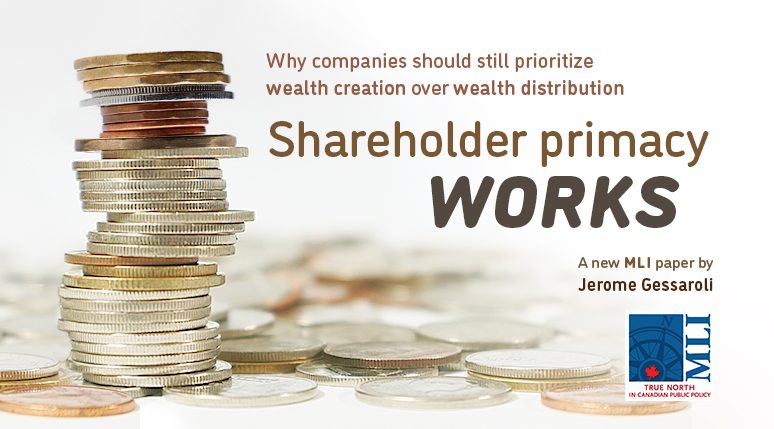OTTAWA, ON (June 9, 2022): In 2019, the federal government amended the Canadian Business Corporations Act to change what companies may consider when determining their corporation’s best interest. The amendments may appear innocuous, but they show a push towards redefining a corporation’s purpose away from the current model of “shareholder primacy” – and the economic consequences of doing so are very real.
In the latest MLI paper, titled “Shareholder primacy works: Why companies should still prioritize wealth creation over wealth distribution,” MLI Visiting Fellow Jerome Gessaroli evaluates the shareholder primacy model in comparison to the stakeholder model. These models define the company’s primary purpose differently – to undertake commerce for the benefit of shareholders or to look after stakeholders (shareholders, employees, consumers, creditors, government, etc.) that have an interest or stake in the company.
Gessaroli argues for the superiority of the shareholder model and its unique ability to create wealth. He finds that supporters of stakeholder primacy base their criticism on five fallacies:
1. Shareholders have short-term interests;
2. A focus on short-term interests negatively affects long-term interests;
3. Innovation and job creation are hampered by underinvestment;
4. Shareholder primacy ignores product safety; and
5. Short-term focus precludes investing in environmental projects.
Addressing each fallacy in turn, he says that if a corporation’s purpose is to maximize its intrinsic value, by this very definition managers must make appropriate short-term and long-term decisions. Indeed, the pandemic has revealed the importance investors place in long-term thinking.
Moreover, evidence suggests that shareholder supremacy has not resulted in underinvestment. Safety, environmental, and other failures by some companies are not a result of shareholder primacy but rather a lack of focus on intrinsic value. And Gessaroli finds that there is ample evidence that financially-sound environmental projects are funded with a shareholder model. Governments can do more to provide incentives to companies to make more green investments while employing policies such as carbon taxes to address the externalities of climate change and pollution.
For Gessaroli, the fallacies perpetuated by stakeholder proponents “invoke a false dichotomy when they state that short-term profit motives force managers to ignore stakeholder interests.”
“They claim that the interests of shareholders and stakeholders compete, and that those competing interests are a zero-sum game, and so the only way to meet stakeholder needs is to adopt a new corporate purpose,” says Gessaroli.
“Replacing shareholder primacy will abrogate the market discipline imperative that forces managers to act competitively and use corporate resources efficiently – the very elements that create wealth, GDP growth, and a flourishing society.”
To read the full paper, click the button below.
***
Jerome Gessaroli is a Visiting Fellow with the Macdonald-Laurier Institute. He writes on economic and environmental matters, from a market-based principles perspective. Jerome teaches full-time at the British Columbia Institute of Technology’s School of Business, courses in corporate finance, security analysis, and advanced finance. He was also a visiting lecturer at Simon Fraser University’s Beedie School of Business.
For more information, media are invited to contact:
Skander Belouizdad
Communications Officer
613-482-8327 ext. 111
skander.belouizdad@macdonaldlaurier.ca







